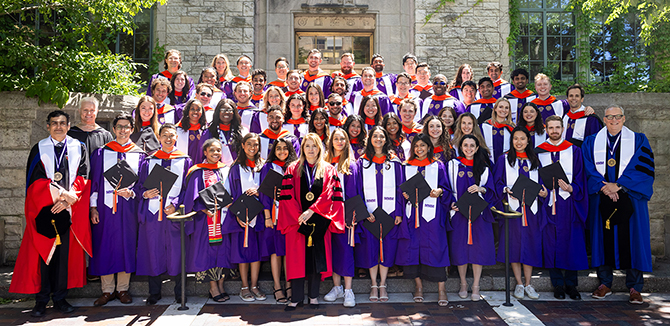MMM Graduates Celebrate Their Time in the Program
The newest class of MMM alumni shared how they grew in the program and the most important lessons they learned.

Northwestern MBA + MS in Design Innovation (MMM) program — a dual-degree program between Northwestern Engineering and the Kellogg School of Management — celebrated its latest class of graduates earlier this summer.
Before this year's graduates said farewell to campus, they took time to reflect on their MMM experience.
What was it about MMM that initially appealed to you?
Jeffrey Ng (MMM '24): I was attracted by the curriculum. As an aspiring product manager, I knew the importance of a design thinking skill set and thought this experience would be a differentiator in a competitive recruiting process. Out of all the MBA skills I learned, I directly used my design thinking skill set when conducting user interviews during my product manager internship in the summer.
Ana Palacios (MMM '24): I wanted to develop design skills to innovate. I particularly liked seeing that professors worked/had worked at IDEO, which was my dream company when applying.
Katie Pimentel (MMM '24): Feeling seen as someone who sees their identity in business as intersectional. I have never just felt like an artist or performer and never just like a businesswoman. MMM made me feel like I could be both and both skill sets were valuable in either field, unapologetically.
Tyler Smith (MMM '24): Simple — it's the people. Attend any info session and you'll see staff and students united by curiosity. They don’t just tackle complex problems. They innovate with empathy and drive real-world change. If you want to surround yourself with great leaders that are equally excited to make an impact, this is where you belong.
How did you grow during your time in the program?
Ng: I grew my design thinking mindset and fostered a greater appreciation for design in daily life. Especially during my study abroad experience in Singapore, I realized how important good design is and found myself frequently thinking about how the design of small things we take for granted could be improved. I also grew my self awareness. Through multiple leadership courses, I learned about how others perceive me. I learned what things I find less comfortable and created opportunities to lean into this discomfort. Finally, I honed my view of what a strong leader looks like and created a plan to build my skills in those areas.
Palacios: Working with my classmates allowed me to acknowledge the traits I value when working with others. I learned about different points of view and how to express your opinion when it is not aligned with others' thoughts.
Pimentel: I became a more humble, empathetic leader. I realized how homogenous my network is at home and how much more work I need to do to surround myself with those much different than me to truly be my best self.
Smith: The program gave me the confidence to approach ambiguous problems.
What are the most important lessons you learned in the program?
Kalyn Chang (MMM '24): The most important lesson I learned was how to make a case for new products and features backed by both human-centered design and business concepts.
Ng: I learned the importance of asking the right questions versus having the right answers, the power of storytelling, and how to harness the power of diverse viewpoints.
Palacios: I learned to develop insights and to organize information in ways or frameworks that expose a business opportunity. I learned how to use human-centered design to deliver more innovative solutions that meet users' needs.
Smith: Innovation is an art and a science. Innovation can be studied, like any subject in school, and when it truly occurs there's a fundamental understanding of user feelings, motivations, and journeys. The biggest lesson I learned is to approach problems with three simple words that inspire ideation: "How Might We." Also, there's no prize for correctly solving the wrong problem. Spend a lot of time defining the problem and check in often with those around you.
How did the program prepare you for life after MMM?
Chang: The skills I learned will be valuable throughout my career, and the close friendships I made will last a lifetime.
Ng: As a product manager, I expect to regularly interact with customers and the design thinking skills I have learned will enable me to extract insights in my interactions with them that will go beyond their articulated needs and uncover those needs they might not have realized they have.
Pimentel: MMM made me be a better problem solver and thinker. If I don’t understand something or don’t know how to solve it, I don’t fake it - I ask questions to seek to understand and to solve a problem.
Smith: I think I'm a better person in the office and at home. It's a great time for self-reflection to understand your values.
